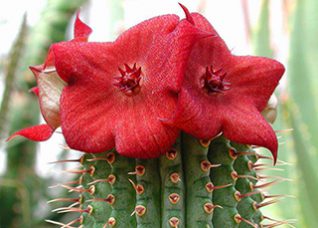
MinerAlert

MinerAlert
Hoodia gordonii (Masson) Sweet ex Decne
Ghaap, Hoodia “cactus”, South African “desert cactus”.

The succulent (fleshy) stems.
The native South Africans consume it fresh, by cutting a small piece of the stem and removing the thorns. Currently, extracts, teas, powders and capsules are commercially available. Some of the products sold may contain only Hoodia or combinations of this plant with other herbs or minerals, such as green tea and chromium picolinate, for example. The data related to clinical trials in humans is very limited at this time.
As an appetite and thirst suppressant. Native South Africans, notably the Khoi-San herders, have used this plant for centuries in order to endure extended periods of time without food or water. This quality may render this plant useful as a treatment for obesity, but more controlled research in humans is needed. The active compound responsible for the plant’s appetite suppressant action is a pregnane glycoside (similar in structure to a cardiac glycoside), which has been isolated and patented as P57, although it is possible that more than one compound is responsible for this action. Hoodia gordonii also contains saponins. This compound acts on the central nervous system (CNS), but may also be active peripherally on appetite regulation, via the vagal afferent nerves, as well as on potentially anorectic peripheral hormones such as cholecystokynin (CKK), for example. Limited data involving a clinical trial with 18 obese men report a favorable effects related to appetite suppression and weight loss. In this trial, the plant was well tolerated by the participants and no significant adverse effects were reported.
Safety/Precautions:
Before you decide to take any medicinal herb or herbal supplement, be sure to consult with your health care professional first. Avoid self-diagnosis and self-medication: Always be on the safe side!